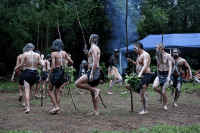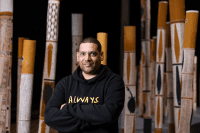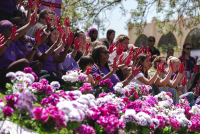Australia’s representative at this year’s Eurovision contest, Electric Fields, sadly didn’t make it to the grand final. However, for Zaachariaha Fielding and Michael Ross, the duo behind Electric Fields, their performance was still a triumph. Electric Fields Makes History at Eurovision with Indigenous Language Performance
“We’re still buzzing. We feel like we did a killer performance and we felt like rock stars. And that audience, I tell you, it was just absolutely giving. It’s going to be a memory that will be embedded with us for the rest of our lives,” said Fielding.

While not qualifying, Electric Fields made history as the first Australian Eurovision contestant to incorporate First Nations language into their entry.
The South Australian electronic dance music duo represented Australia with their 2024 release “One Milkali (One Blood)” in Malmö, Sweden. The song, with lyrics in English and Pitjantjatjara/Yankunytjatjara, celebrates unity and diversity, with the phrase “milkaḻi kutju” meaning ‘one blood’ in the Aboriginal languages.
Zaachariaha Fielding, who hails from Mimili, a remote community in far-north South Australia, is passionate about preserving Indigenous languages. The use of Pitjantjatjara/Yankunytjatjara in “One Milkali” reflects this commitment.

The song’s repetitive nature and variation make it an excellent medium for language learning and artistic expression. Additionally, Electric Fields’ other songs, such as “Anpuru Maau Kutjpa,” incorporate ceremonial singing styles common to the Western Desert region, showcasing the diversity of Indigenous musical traditions.
The Eurovision performance featured artwork by Fielding, inspired by traditional song grounds near his home, blending modern and traditional elements.
Electric Fields joins a legacy of Australian artists who have used their music to celebrate Indigenous culture and language. In 1983, Warumpi Band released the first rock song in an Indigenous language, “Jailanguru Pakarnu (Out from Jail),” sung in Pintupi. Today, artists like Yothu Yindi, Baker Boy, Emily Wurramara, and the Ripple Effect Band continue to express pride in their cultural identity through music sung in various First Nations languages.
For Patricia Nja-wakadj Gibson of the Ripple Effect Band, singing in Indigenous languages is a powerful connection to ancestors and community. She believes that it brings people together and makes them strong.
The use of First Nations languages in music not only preserves linguistic heritage but also fosters cultural exchange and understanding. By showcasing Electric Fields at Eurovision, Australia celebrates its diverse cultural identity and acknowledges First Nations perspectives and languages on the world stage.
The National Indigenous Cultural Centre (NICC) is an Indigenous home.
We provide Indigenous products, music, art and news.
If you want Indigenous gifts and merchandise, bush tucker food at your next event or Indigenous entertainment at your next party, expo or conference, feel free to contact us!
Visit our page: https://nicc.org.au/
Tony Clemenger.
Chief Executive Officer.
Tel: 0419431649.
Level 1 397 Chapel Street South Yarra 3141.








